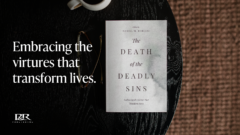Yesterday my friend Justin Taylor (I think he’s everybody’s friend, actually. I’ve been meaning to ask him–is there a Reformed author whose Justin hasn’t spoken to just a couple of days ago?), sent me an article entitled “The Ambiguously Cured Soul” that was written by David Powlison and published in the Spring 2001 edition of The Journal of Biblical Counseling. It is a fascinating article and Justin was kind enough to ask if I could post it on my site. Dr. Powlison was equally kind to agree to this. I would encourage you to work through the six-page article before reading the following commentary on it. It is in PDF format and you can access it here.
Powlison frames this article around the story of Amelia, a woman who struggles with lesbian fantasies and whose story appeared in the journal of a Christian counseling center. Here is a portion of Amelia’s story:
The idea of counseling scared the wits out of me. I’d never told anyone my struggle. I’d had lots of friends, was always popular and vivacious. People liked me, but I always thought, “If they knew the real me, I’d be rejected.” So I never let anyone in. They’d think I was some weird and dangerous pervert, though I’d never acted out my fantasies. I never consciously chose to have lesbian desires. It seemed like something that just happened to me as a child, a decision made for me, something I “discovered” inside me, not something I decided.”
So what happened? My therapist accepted me. That allayed my anxieties. As we worked in counseling over the next year and a half, he helped me to understand the reasons for my lesbian attraction. My father had been an alcoholic. When I was a child he beat me often, and sometimes sexually molested me. His anger scared me–it still does. I learned never to trust men, and to look towards women for love. But my mom was mostly helpless and passive through it all, preoccupied with her own troubles. She could never really protect or comfort me. So I spent my life trying to meet my need for love that no one had ever met. That parental combination made me hungry for an intimate, accepting relationship with a woman, a “precious friend” who’d fill the empty space inside.
Counseling taught me a perspective on my past, to see how the pain and disappointment of my family upbringing produced my struggles with lesbian fantasy. I’ve learned to understand why I am the way I am. These realizations about my past have helped me to make better choices in the present. My counselor helped me to learn that only God can fill the void inside me, and can quench my deep thirst for an accepting relationship.
God has been at work in me. Jesus was “tempted in all ways as we are, yet without sin,” and I’ve learned more and more to come to Him, and that He will “never leave me nor forsake me.” I’ve become accountable to my husband and a couple of female friends at church, not just to my therapist. I’ve learned to identify the situations when I’m tempted to old patterns of fantasy, and to resist more effectively. Praise Him that I am changing!
This seems to be a wonderful story of healing. Amelia came to understand the source of the sins with which she struggled and found useful ways of dealing with them when they strike at her. But, while affirming that Amelia seems to be a “sincere sheep, wanting her Shepherd’s presence, and wanting to put secret sin to death, … it appears that her counselor nourished her with a mixture of Bible truths, half-truths, and fictions.” The Holy Spirit was good to animate the biblical truths and to bear fruit in her life. And yet her life now bears an interpretive map that offers confusion and error. Amelia is an ambiguously cured soul.
One aspect of David Powlison’s ministry that has often challenged me is that he gives no quarter to sin. He never allows sin to be shown to be anything other than what it is: an offense to God that arises from a person’s sinful nature. For instance, when speaking of the counselor’s method of helping Amelia understand the source of her sin, he writes, “Knowledge of a person’s history may be important for many reasons: compassion on sufferers, sympathetic understanding, locating the present within an unfolding story, knowledge of characteristic temptations, and so forth. But it never determines the heart’s proclivities and inclinations.” We know this because many people experience similar events in their histories and react differently. One woman may indulge in lesbian fantasies, another may drift from man to man, and another may seem to go through life unscathed.
There is a certain mysterious quality to sin that many modern methods of counseling ignore. “Psychodynamic myth has mingled a significant illusion with elements of Christian truth. To say that her lesbian struggles were caused by unhappy childhood circumstances fails to bow before the riddle, unfathomableness, and culpability of sin. Sin is its own final reason. Any theory that claims to explain sin actually falls prey to sin’s intellectual effects, and wriggles away from both theological truth and psychological reality. Sin is the deepest explanation, not just one more problem begging for different and “deeper” reasons.”
Did you catch that? “Sin is its own final reason.” We can only do so much to explain sin, for ultimately, there is a mystery to sin that we just cannot understand. We can attempt to find reasons for our sin, or look into the past to find its source, but in the end, sin is the deepest explanation and the final reason.
But this is not the purpose of Powlison’s article. The article shows something that has been discussed a fair bit in the Christian blogosphere: so often truth and folly are bound up together. “Things would be nice and tidy if you could always keep the good guys straight from the bad guys. But often it’s not possible. The same person who is a primary means of grace to another may also be a secondary means of confusion–or a primary means of confusion and a secondary means of grace. We consciously aim to disciple others in the truths we know and seek to live – but others easily catch our errors, blind spots, and failings in the bargain!” Where there is sin, and sin exists in all of us, there will be confusion. Where there is truth there is so often error. This ambiguity is constant. There are not always good guys and bad guys. Rather, often the good guys are the bad guys.
To learn more about Dr. Powlison, visit CCEF. You may also be interested in reading his book Seeing With New Eyes. This article has been reprinted as one chapter in that book and the approach is extended and applied to other issues such as motivation, defense mechanisms, feelings, and love languages.










